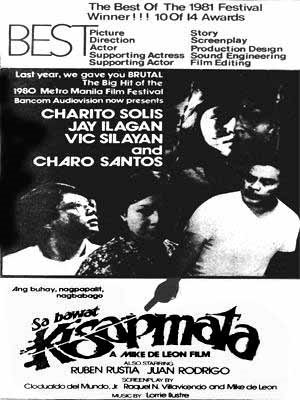
KISAPMATA (IN THE WINK OF AN EYE)
Philippines, 1981, 90 minutes, Colour.
Vic Silayan, Charito Solis, Charo Santos, Jay Llagan.
Directed by Mike De Leon.
This film is based on actual events, recorded in The House on Zapote Street, in a collection of reportage on crime. The setting is the late 70s-early 1980s. However, the subject and the treatment still seem topical.
The major part of the film focuses on a young woman who works at a bank and becomes pregnant and wants to marry the father who works in the bank with her. Her father is a dominant former policeman. Her mother is a seamstress, repressed and quiet. While the father gives his consent and seems genial towards the prospective groom, he has his own secrets, his possessiveness towards his daughter and finds all ways of confining her to the house, even after her marriage. This puts strains on the marriage, the young woman having to come to terms with her father and wanting to escape, the exasperation of the husband and his trying to work out what to do, getting advice from his very sympathetic father.
Towards the end, the realism moves to melodrama and a shocking ending where the father kills his wife, daughter and son-in-law and then turns the gun on himself.
The film was directed by Mike De Leon, a prolific Filipino director. It was written by Clodualdo Del Mundo Jr, a writer for many of the films of Lino Brocka.
1.The impact of the film? For a Philippines audience? For world audiences? Based on actual events?
2.The city setting, the affluence of the father and his family, the home? His car? His daughter working in a bank? The in-laws’ house? Comfortable lives?
3.The atmosphere of realism, the musical score? The dark photography for the interiors? The moods?
4.The situation: Mila and her telling her parents about her wanting to marry, her pregnancy? Her mother’s shock? The reaction of her father? His relationship with her? Dominance? His seeming decision to approve? His meeting with Noel, the discussions, his hobby of developing worms and selling them? The smiles – then the harsh and sinister words? His reaction to his daughter, the meals, Noel’s father coming to the meal, the discussions, the issue of dowry, of support?
5.The wedding, the joy of the ceremony, the religious commitment, the dance at the reception? Mila’s mother taking ill, the father sending her home, wanting his daughter to look after her? Forcing Noel to come to their house on the wedding night? Saying that he had ruined the honeymoon? His offhand and cutting remarks?
6.The character of the father, former policeman, talking about his cases? His retirement? The relationship with his daughter? Dominating his wife? At home, his reactions to Mila, forcing her to stay in the house? Proposing that the couple stay for some days, getting the mother to ask? The plan that they stay at the house always?
7.Mila, meek, moody, sick? Not answering the door, not answering the phone to Noel, leaving him on the street? Their discussions? Noel trying to fathom what was happening? His decision to move away, getting the advice of his father?
8.Mila, her diary, her despising of her father? Wanting to escape? Getting her mother’s help, the mother deciding to support her? Her leaving, in the bus, the phone call to Noel? Travelling away?
9.The father going to Noel’s father, admitting that he was wrong? Persuading them to come back? Their return?
10.At home, the confrontation? The possibility of a future? The father and his gun, shooting his wife, shooting Noel, shooting his daughter, turning the gun on himself?
11.The story seen in the patriarchal Philippines situation? The role of the men, suppressing the women? The inherent violence?